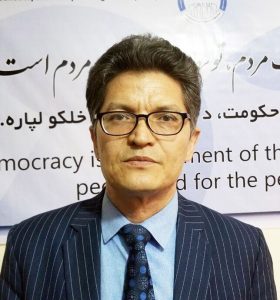People’s Voice is not Heard

Some civil society activists believe that the government negotiating team is based on political affiliations. Therefore, it cannot represent all Afghans and a large part of the society is ignored.
In an interview the CSHRN, Mr. Ahmadi said that all citizens, including civil society activists, religious scholars, women and youth have an important role to play in the peace process. However, he believes that people’s voice is not heard in the peace talks. He added that currently, the negotiation is only between government and the Taliban.
CSHRN: Is the government’s negotiating team inclusive?
Ahmadi: There are such claims from the government, but the government has selected the members of the negotiating team based on their political affiliations. Representatives of powerful individuals and groups are members of the team, but minorities representatives are not. There may be important aspect in selecting negotiating team members. But in general, due to concerns about preserving achievements and values, many people, including religious scholars, intellectuals, media and civil society representative are ignored in these negotiations. Civil society activists should be able to monitor the peace negotiations. However, such an opportunity is not being provided yet.
CSHRN: What is your assessment of what has happened in the negotiations so far?
Ahmadi: It is a historic opportunity and a valuable process. On the one hand, the people are tired of the war, waiting for an agreement to be reached the peace, and on the other hand, they are worried about the possibility of repeating the bitter experiences of the past. Another issue is that the peace process has slower progress and there are challenges along the way. Each side insists on its own demands for having a greater share of power. Additionally, the citizens do not know exactly what is happening in the negotiations.
CSHRN: Will the negotiations reach a positive outcome?
Ahmadi: The main concern of civil society is that the Taliban have not changed. They have the same thoughts and ideologies as before. For this reason, there are concerns that, as a result of an agreement, women’s rights will not be taken into account and the achievements of the last two decades will be traded. On the other hand, some are optimistic that the Taliban have changed and claim that they accept women’s rights in accordance with Sharia law. While we know that the Taliban’s view of Sharia is quite different from modern interpretations. When the Taliban say that women’s rights are in accordance with Sharia, that means, women should not go to school or work.
CSHRN: Can female members of the negotiating team defend women’s rights?
Ahmadi: Some female member of negotiating team, despite having good political experience, cannot represent all women groups in the country. The female members of the negotiating team are among those who have become repetitive figures involved in every process. They cannot represent all Afghan women, because the women of the country form different intellectual groups in society and their representation cannot be reduced to just a few. In any case, I think it would be better if the election of female representatives was inclusive. Meaning that women from different social groups were selected to join the government’s negotiating team, and new individuals were given the opportunity.
CSHRN: Some believe that the very presence of women in the negotiations can have an impact on the Taliban’s view of women. What is your opinion?
Ahmadi: Their presence is very important. The Taliban negotiating with women means that they have willingly or unwillingly accepted the presence of women. Moreover, the Taliban’s perception of women may change and they may accept that women can also be politicians, journalists or leaders. Overall, the Taliban listening to women directly is good news.
CSHRN: Is restrictions on women’s rights acceptable?
Ahmadi: I think that trading the rights and freedoms of women or other citizens, including ethnic and religious minorities, to achieve peace will not lead to lasting peace at all. The agreement reached will only lead to a temporary cessation of the war, which I think will lay the groundwork for a long conflict in Afghanistan.
CSHRN: How will the Taliban’s participation in the government affect the activities of civil society?
Ahamdi: Our concern is that as a result of an agreement between the two sides, the rights of citizens, especially women and minorities, and freedoms such as freedom of expression and media will be restricted. If so, we will have to trade human rights and freedoms with peace. This means a return to the era of oppression, where the freedoms will be limited and civil activities will be prohibited. At the era that the world is in continuous development and progress, we will relapse to the past which is an irreparable historical setback for Afghanistan.
CSHRN: What issues should the government prioritize in the negotiations?
Ahmadi: The government can represent the people well when its demands and priorities are in line with the demands of the citizens, in which case the people will also support the government. The red line must first be the preservation of the democratic structure and system, and secondly, the constitution and its amendment based on the law itself. Another issue that many people, including civil society, want is the preservation of the international commitments and documents that Afghanistan has acceded to, and the observance of international human rights conventions so that Afghanistan does not retreat to the past by leaving the international community.
Mr Ahmadi said that it is difficult to predict the outcome, as the agenda of the negotiations have not yet been finalized. However, he believes that the outcome of the talks will depend on the peace negotiating team and its strategy for advancing the negotiations.